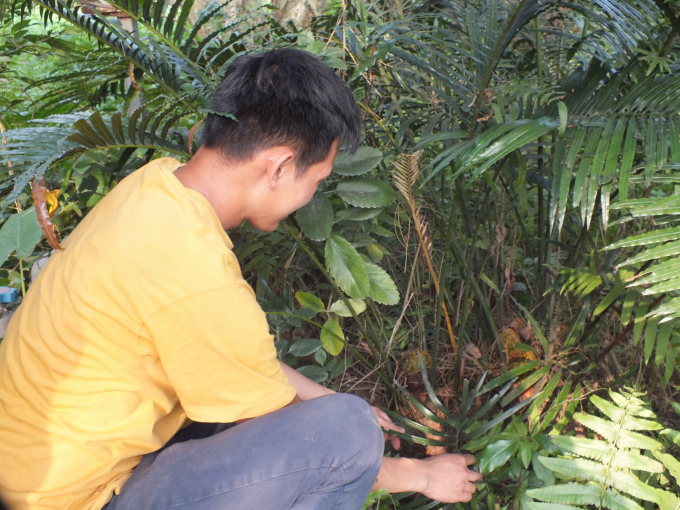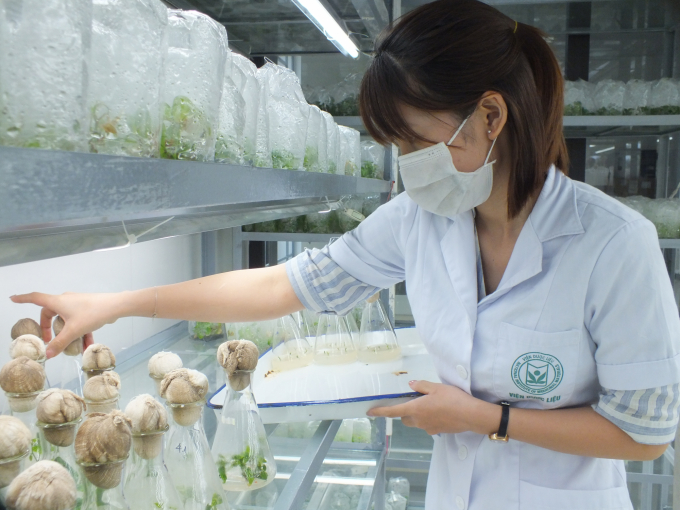June 24, 2025 | 03:41 GMT +7
June 24, 2025 | 03:41 GMT +7
Hotline: 0913.378.918
June 24, 2025 | 03:41 GMT +7
Hotline: 0913.378.918
Deputy Director of the Institute of Medicinal Materials under Ministry of Health, Dr Phan Thuy Hien said that Viet Nam now had a high demand for medicinal herbs.
Medicinal herbs are widely used in traditional medicine hospitals, pharmaceutical companies, drugstores, traditional medicine clinics and pharmaceutical business establishments.
However, about 80% of the number of medicinal herbs used in Vietnam now are imported, mostly from China.
Hien said that in the past, the cultivation and development of medicinal plants used to be popular in the country. The medicinal plants were not only found and exploited naturally in mountainous areas but also cultivated in large scale planting in provinces.
However, between 2000 and 2010, the medicinal plant growing areas in the country tended to decline.
The sharp decrease in the medicinal plant growing areas was not because medicinal plants had lower production value than those of other crops, Hien said, adding that the main cause related to the importation of cheap herbal medicine.
Consequently, pharmaceutical businesses prefered using imported cheap medicinal plants which domestic medicinal herbs failed to compete with, Hien said.

Precious medicinal plants are preserved at the National Institute of Medicinal Materials. Photo: Le Ben.
Since 2013 when the Prime Minister approved Decision No. 1976/QD-TTg (Decision 1976) on the master plan on the development of medicinal herbs until 2020, with a vision to 2030, more tailored policies for medicinal plants have been launched, paving the way for the further development of Vietnam’s medicinal materials.
For a long time, there was a shortage of mechanisms, policies and resources for medicinal materials, Hien said.
For examples, the 2004 Ordinance on Plant Varieties did not have any regulations on medicinal plant varieties.
Therefore, when researching, selecting, testing or importing medicinal plant varieties, it is very difficult to recognise, protect and manage the production and circulation of medicinal plants.
Moreover, there was no Government’s body specialising in managing medicinal plants. The National Institute of Medicinal Materials under the Ministry of Health is the only unit that has activities relating to the studies, preservation and development of medicinal plants as well as consultation to the Health Ministry over relevant issues.
Fortunately, until now, besides the Government's Decision 1976, the Law on Cultivation in 2018 and guiding documents, medicinal plant varieties are under the scope of the Law. Specific policies have been given to develop medicinal plants.
In 2019, the Ministry of Health also issued a list of 100 medicinal herbs with high medical and economic values which would be given priority to develop during the 2020-2030 period.

Breeding precious medicinal plants at National Institute of Medicinal Materials. Photo: Le Ben.
As the latest relevant move, on March 17, 2021, the Government issued Decision 376/QD-TTg approving a program to develop the domestic pharmaceutical industry until 2030, with a vision to 2045.
Under the decision, the rate of using domestic medicinal herbs and herbal medicines increased by at least 10% compared to 2020.
Vietnam would build eight areas for sustainable exploitation of natural medicinal herbs. It also planned to have two to five large-scale medicinal production growing areas, each exploitation area or growing area has one or two chains of research, cultivation, processing and production of medicinal herbs in compliance with the World Health Organisation’s Guidelines on good agricultural and collection practices (GACP) for medicinal plants.
By 2030, the use of herbal medicines will increase by at least 30% compared to that of 2020; Vietnam will develop 10-15 migratory medicinal herbs to meet domestic demand.
By 2045, Vietnam is expected to have drugs invented from endemic medicinal herbs which are researched, manufactured and copyrighted. Vietnam expects its pharmaceutical industry to contribute over US$ 20 billion to its GDP.
Under the programmes and policies, the Ministry of Agriculture and Rural Development would join in researching and developing medicinal plant varieties. The ministry would also join offering farming techniques, disease prevention and control measures.
According to Dr Phan Thuy Hien, at present, Vietnam has more than 5,100 species of medicinal plants, many of which are also subject to the management of the agricultural sector.
In the past, when it came to medicinal plants, many people often thought that medicinal plants were non-timber forest products and grown only under the forest canopy.
However, many medicinal plants are also grown like crops. Many medicinal plants in Vietnam can be grown intensively on agricultural land.
For medicinal plants, which are those being harvested from nature, Vietnam has also had conservation policies in line with the Government's gene conservation programme.
The National Institute of Medicinal Materials currently has 6 units engaged in the investigation, assessment and conservation of medicinal plants to build a database of Vietnamese medicinal resources, Hien said.
At present, the institute has been implementing programmes to investigate and conserve medicinal plants in the Southeast and Southwest regions, including the construction of conservation gardens to preserve precious genetic resources, and then systematise the database on Vietnamese medicinal plants.
The institute is also proposing the investigation and conservation of medicinal plants in the Northwest region and then spread to other regions across the country.
In recent years, it imported, evaluated and tested medicinal plants, some of which have been transferred and put into production.
In addition to conserving the source of indigenous medicinal plants in the country, it was needed to import medicinal plant varieties to gradually diversify medicinal plant species, Hien said, calling for supporting policies in the coming time.
“To develop medicinal plants, it is necessary to have a close co-operation between pharmaceutical enterprises and medicinal plant growers as the production of medicinal plants have to meet many strict requirements and standards,” Hien said.
If people themselves grow medicinal plants spontaneously, it will be difficult to meet the technical standards, she said, warning that pharmaceutical enterprises would likely not accept substandard medicinal materials.
Translated by Hien Anh
/2025/06/17/3942-2-143243_548.jpg)
(VAN) Recently, in Sweden, the Secretary of the Binh Dinh Provincial Party Committee presented the Investment Registration Certificate for the 'Polyester Fabric Recycling Complex' project to SYRE Impact-AB Company.
/2025/06/12/3721-2-202745_83.jpg)
(VAN) TH made an impression at Seoul Food 2025 with its line of natural beverages, paving the way for Vietnamese food products to enter the South Korean market.

(VAN) Soc Trang's success in rice exports stems from a strategy of developing fragrant and specialty rice cultivation areas and standardizing production toward low-emission practices.
/2025/06/11/1311-5-120811_839.jpg)
(VAN) The pig farming industry is facing the challenge of comprehensive restructuring to meet requirements for quality, safety, traceability, and market expansion both domestically and for export.

(VAN) Vietnam considers participating in ALGROALBA in order to expand agricultural production, coordinate the assessment and effective exploitation potential land.
/2025/06/05/5314-1-184727_407.jpg)
(VAN) From seemingly worthless fish scales and skin, enzymes and lactic ferments can transform by-products into peptides, opening a sustainable, effective business direction and elevating Vietnamese seafood.

(VAN) TTC AgriS and IFC signed a strategic partnership to develop a sustainable agricultural value chain, aiming to achieve the Net Zero target by 2035.